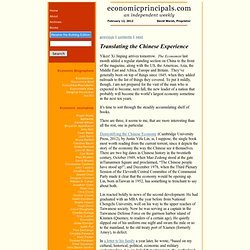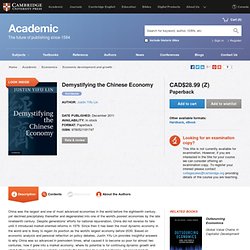

Out of the Darkness. Myth_of_asias-miracle. Translating the Chinese Experience. Yikes!

Xi Jinping arrives tomorrow. The Economist last month added a regular standing section on China to the front of the magazine, along with the US, the Americas, Asia, the Middle East and Africa, Europe and Britain. They’ve generally been on top of things since 1845, when they added railroads to the list of things they covered. To put it mildly, though, I am not prepared for the visit of the man who is expected to become, next fall, the new leader of a nation that probably will become the world’s largest economy sometime in the next ten years.
It’s time to sort through the steadily accumulating shelf of books. There are three, it seems to me, that are more interesting than all the rest, one in particular. Demystifying the Chinese Economy (Cambridge University Press, 2012), by Justin Yifu Lin, is, I suppose, the single book most worth reading from the current torrent, since it depicts the story of the economy the way the Chinese see it themselves. Demystifying the Chinese Economy. China was the largest and one of most advanced economies in the world before the eighteenth century, yet declined precipitately thereafter and degenerated into one of the world's poorest economies by the late nineteenth century.

Despite generations' efforts for national rejuvenation, China did not reverse its fate until it introduced market-oriented reforms in 1979. Since then it has been the most dynamic economy in the world and is likely to regain its position as the world's largest economy before 2030. Based on economic analysis and personal reflection on policy debates, Justin Yifu Lin provides insightful answers to why China was so advanced in premodern times, what caused it to become so poor for almost two centuries, how it grew into a market economy, where its potential is for continuing dynamic growth and what further reforms are needed to complete the transition to a well-functioning, advanced market economy. “Justin Lin’s Demystifying the Chinese Economy is a tour de force.
Capitalism with Chinese Characteristics. Capitalism with Chinese Characteristics Cambridge University Press 9780521898102 - Capitalism with Chinese Characteristics - Entrepreneurship and the State - By Yasheng Huang Copyright Information Sloan School of Management, Massachusetts Institute of Technology CAMBRIDGE UNIVERSITY PRESS Cambridge, New York, Melbourne, Madrid, Cape Town, Singapore, São Paulo, Delhi Cambridge University Press 32 Avenue of the Americas, New York, NY 10013-2473, USA www.cambridge.org Information on this title: www.cambridge.org/9780521898102 © Yasheng Huang 2008 This publication is in copyright.

First published 2008 Printed in the United States of America. Economics Department: Course Unit: Economic development of modern China. Economic development of modern China Course Code: Unit value: Year of study: Year 3 Taught in: Full Year This course seeks to describe and analyse the principal features of China's economic system as it has evolved since 1949, and examines the nature and sources of China's economic growth and structural change at both the macro and sectoral levels.

Objectives and learning outcomes of the course On successful completion of the course, students will be able to:1. Method of assessment Assessment weighting: Exam 80% / Coursework 20%. Suggested reading Background Reading1.